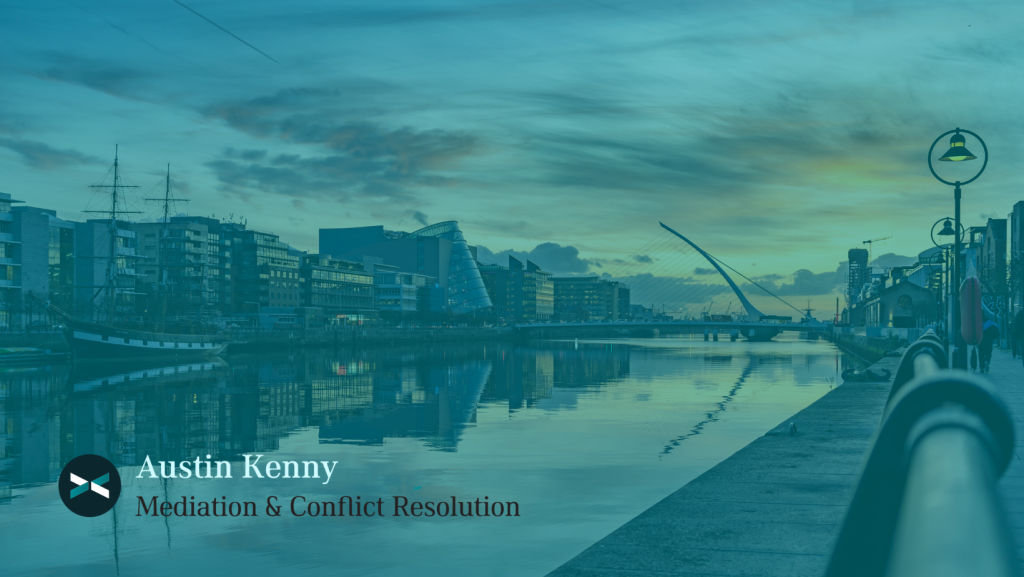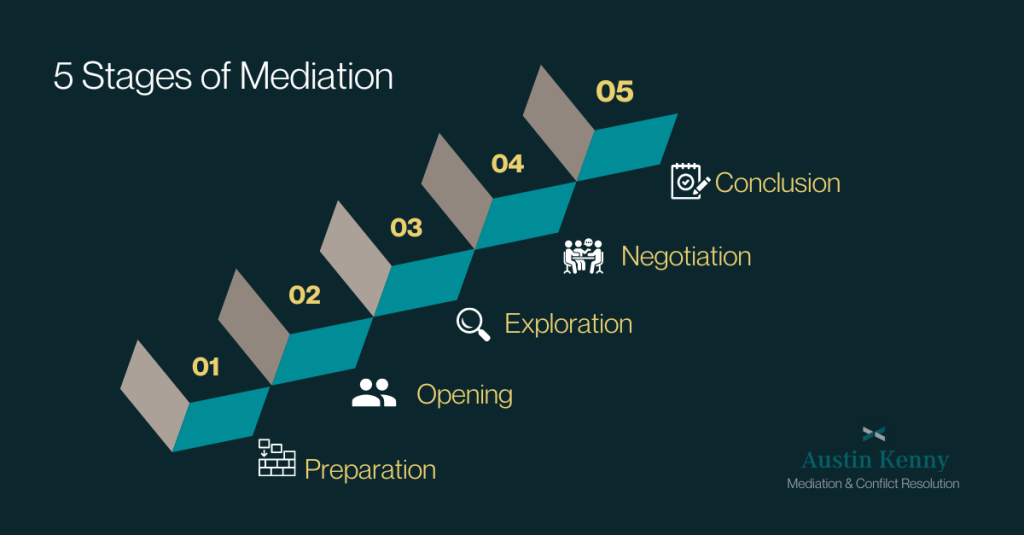
Dublin’s Leading Mediation Service
In the heart of Dublin, Austin Kenny Mediation & Conflict Resolution offers professional mediation services designed to navigate the complexities of conflict with dignity and respect. Whether you’re facing business disputes, family disagreements, or any other form of conflict, our mediation services Dublin is here to guide you toward resolution. With years of experience, a greater than 80% success rate and a deep commitment to resolving disputes, Austin stands ready to assist you through every step of the mediation process.
Seeking A Mediator in Dublin?
Navigating conflicts can be challenging, but at Austin Kenny Mediation Service Dublin & Conflict Resolution, we understand the value of resolving disputes outside the courtroom. As one of Dublin’s leading professional mediators, you will have access to my extensive mediation experience so that you have the best possible opportunity of reaching a deal. Our mediation services provide a private, controlled, and supportive environment where all voices are heard. My overall success rate stands at 83% and I will work with you and the other side to make sure that resolve any obstacles preventing settlement.
By choosing us, you’re not just seeking a resolution; you’re investing in a resolution.

Mediation and Conflict Resolution Services in Dublin
While there are countless use cases for mediation in resolving conflicts, our select services are designed to provide clarity, direction, and resolution in various disputes, including but not limited to:
- Partnership and Boardroom disputes: Facilitating dialogue between partners and board members to resolve conflicts and realign on common business objectives.
- Shareholder disputes: Addressing disagreements among shareholders, focusing on equitable solutions that serve the best interest of the company and its stakeholders.
- Family business disputes: Navigating the delicate balance between family relations and business interests, aiming for solutions that honour both personal and professional goals.
- Landlord and Tenant: Mediating differences between landlords and tenants to find fair and practical resolutions to issues relating to leases, property conditions, and rent disputes.
- Construction contract disputes: Helping parties involved in construction projects resolve disputes over contracts, work quality, delays, and payments.
- Breach of Contract: Assisting in the resolution of disputes arising from allegations of unmet contractual obligations in various business contexts.
- Professional negligence: Facilitating resolutions in disputes over alleged negligence by professionals, ensuring fair outcomes for both parties.
- Debt Collection: Assisting creditors and debtors in finding mutually agreeable solutions to debt recovery, avoiding the need for more confrontational legal actions.
- Employment Termination: Mediating disputes related to the termination of employment, focusing on fair and respectful resolutions.
- Probate: Helping families and beneficiaries resolve disputes over wills and estates, ensuring a process that respects the deceased’s wishes and the beneficiaries’ rights.
- Separating couples: Facilitating amicable agreements on property division, child custody, and other concerns for couples going through separation.

The Benefits Of Mediation:
- Cost-Effectiveness: Mediation generally requires less time and financial investment than traditional litigation. By streamlining the preparation, negotiation, and conclusion stages, parties can avoid the extensive legal fees and court costs associated with going to trial.
- Confidentiality: Unlike court proceedings, which are public, mediation is a private process. The confidentiality aspect ensures that sensitive information disclosed during the mediation remains between the parties involved, the mediator, and any legal representation, protecting reputations and business relationships.
- Control and Flexibility: Mediation gives parties more control over the outcome of their dispute. Unlike a court verdict, which is decided by a judge or jury, mediation allows the parties to negotiate and agree upon a solution that works best for them, offering flexibility in terms of possible outcomes and agreement terms.
- Speed: The mediation process is typically much faster than the court system. Since parties can schedule mediation at their convenience and work intensively through the stages of preparation, exploration, negotiation, and conclusion, disputes can be resolved in a fraction of the time it would take to litigate the same issues.
- Preservation of Relationships: The mediation process, particularly through its exploration and negotiation stages, encourages open communication and mutual understanding. By focusing on collaborative problem-solving rather than adversarial confrontation, mediation can help preserve and sometimes even strengthen relationships between the parties, which is especially important in disputes involving ongoing business or personal connections.

How To Prepare For The 5 Phases of Mediation
Our process is structured to ensure confidentiality, neutrality, and fairness. It involves:
- Preparation: Setting the foundation for successful mediation by selecting a mediator, arranging logistics, exchanging documents, and establishing communication between the mediator and parties.
- Opening: Initiating mediation with introductions, an overview of the process by the mediator, and opening statements from each party, conducted when deemed appropriate.
- Exploration: The mediator engages in private discussions with each party separately, uncovering critical information to help break any deadlocks.
- Negotiation: With the mediator’s guidance, parties engage in direct and indirect negotiations, assessing their positions’ strengths and weaknesses to explore possible resolutions.
- Conclusion: A legally binding agreement is drafted and signed by lawyers representing both sides, formalising the settlement reached through mediation.
Contact Us For Your 100% Confidential Consultation
Frequently Asked Questions About Mediation
- How long does mediation typically take? The duration of mediation depends on the complexity of the dispute but generally ranges from a few hours to several sessions over a few weeks.
- Is the mediation agreement legally binding? While the process itself is not legally binding, once all parties sign the mediation agreement, it becomes legally binding.
- How is mediation different from going to court? Mediation is a confidential, voluntary process that emphasizes mutual agreement and preserves relationships, unlike the often adversarial court process.
- What if we can’t reach an agreement through mediation? In the unlikely outcome that mediation doesn’t result in an agreement, parties may pursue other legal options. However, many find that mediation brings them closer to resolution, even if it’s not immediate.
- Can mediation be conducted virtually? Yes, we offer both in-person and virtual mediation sessions to accommodate all parties’ needs.
Get in Touch for Professional Mediation in Dublin
Ready to find a peaceful resolution to your conflict? Contact us at Austin Kenny Mediation today to schedule your initial consultation and take the first step towards resolution. Our team is dedicated to providing the highest standard of mediation services in Dublin and across Ireland.
